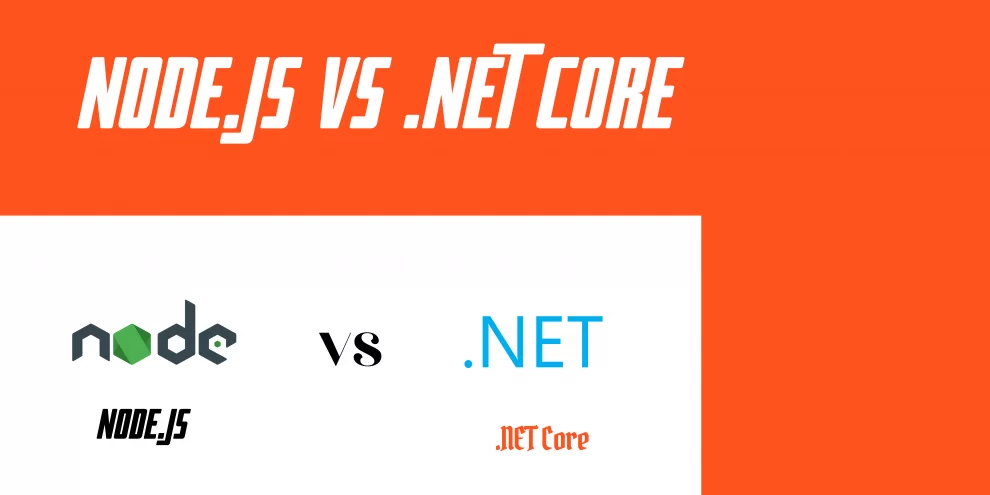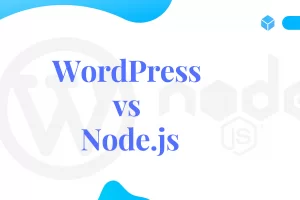In the dynamic landscape of backend development, the pivotal decision at hand revolves around choosing between Node.js and .NET Core. Node.js, an open-source JavaScript runtime, is renowned for its rapid performance and scalability, while .NET Core, a product of Microsoft, stands as a versatile, cross-platform framework equipped with an extensive arsenal of tools and libraries.
This article delves deep into the intricate balance of considerations that come into play when choosing between Node.js and .NET Core. Both frameworks present distinct attributes in terms of performance, community support, ecosystems, and flexibility. The outcome of this decision holds profound implications for the efficiency and capabilities of your backend development projects. By exploring the nuanced differences and strengths of each framework, you’ll gain a comprehensive perspective that empowers you to make an astute choice that aligns perfectly with the demands of your backend development endeavors.
What is Node.js?
Choosing between Node.js and .NET Core is a critical decision in backend development. Node.js is an open-source server-side runtime environment leveraging the V8 JavaScript engine. It expands JavaScript’s capabilities beyond web browsers, enhancing its versatility. Created by Ryan Dahl in 2009, Node.js has gained popularity in the web development community due to its remarkable speed and scalability.
Notably, Node.js features a non-blocking, event-driven architecture, excelling in efficiently handling multiple connections and concurrent operations. This makes it a prime choice for applications demanding real-time features, low-latency responses, and high concurrency. It’s especially suited for chat applications, online gaming platforms, streaming services, and similar projects.
Additionally, Node.js benefits from a thriving community of developers, resulting in an extensive ecosystem of libraries and packages accessible through the Node Package Manager (npm). This ecosystem streamlines development, providing solutions for diverse requirements and facilitating rapid, efficient progress in web and server-side programming domains.
What is .NET Core?
When Choosing Between Node.js and .NET Core, .NET Core, now known as .NET 5 and later versions, stands as an open-source, cross-platform framework from Microsoft. It’s engineered for crafting modern, high-performance, and scalable applications, encompassing web applications, cloud-based services, and more. .NET Core diverges significantly from the traditional .NET Framework, showcasing cross-platform adaptability and modularity for enhanced flexibility and efficiency.
One of the standout attributes of .NET Core is its cross-platform compatibility, enabling the development and deployment of .NET Core applications on various operating systems, such as Windows, macOS, and Linux. This versatility caters to developers working across diverse platforms, allowing them to create applications with universal accessibility.
.NET Core’s renown lies in its performance and scalability. It boasts high-speed application execution while maintaining a lightweight and resource-efficient profile. These qualities make it a preferred choice for building microservices and cloud-based applications, apt for managing large volumes of requests and delivering rapid responses.
Moreover, the .NET Core ecosystem presents a wealth of libraries and tools, including ASP.NET Core for web development, Entity Framework Core for database interaction, and a range of development and debugging utilities offered by Microsoft. This comprehensive ecosystem streamlines the development journey, empowering developers to construct robust and efficient applications across a broad spectrum of use cases.
Also Read: 10 Tips for Laravel Performance Optimization in 2023
Performance and Speed
Node.js:
In the realm of performance and speed, Node.js emerges as a formidable contender. Its unique non-blocking, event-driven architecture is the secret behind its exceptional speed and efficiency. This architecture allows Node.js to handle a high volume of simultaneous connections with ease. Consequently, Node.js is the go-to choice for applications requiring low latency and high concurrency, such as real-time chat applications, online gaming platforms, and streaming services..NET Core:
On the other side of the spectrum, .NET Core offers robust performance but may not match the blazing speed of Node.js in specific scenarios. This is not to say that .NET Core is sluggish; rather, it excels in other areas like enterprise-level applications and web APIs. In the performance and speed race, Node.js has a sprinter’s advantage, but .NET Core boasts a well-rounded and steady pace. Your choice should depend on your project’s specific performance demands.
Community Support
Community support is a critical factor in the success and adoption of any software framework, and both Node.js and .NET Core benefit from active and growing communities of developers and users.
Node.js:
Node.js enjoys a substantial and vibrant community. Its open-source nature has attracted developers from around the world, contributing to its popularity and the wealth of resources available. Node.js has a strong online presence, with an abundance of tutorials, articles, and forums where developers can seek help and share their expertise. The Node Package Manager (npm) is a central part of this ecosystem, offering a vast collection of open-source packages and modules for various development needs. The large and active community is one of the reasons Node.js is a popular choice for both newcomers and experienced developers..NET Core:
While .NET Core’s open-source community may not be as extensive as Node.js’s, it is growing steadily, thanks to Microsoft’s commitment to open-source development. Microsoft actively contributes to the .NET Core community, ensuring timely updates, security patches, and improvements. There’s a growing number of tutorials, documentation, and discussions available online for .NET Core. Microsoft’s collaboration with the open-source community and its ongoing commitment to .NET Core’s development have fostered a sense of trust and reliability among developers using the framework.
In summary, both Node.js and .NET Core have robust community support. Node.js benefits from a large and diverse open-source community, while .NET Core’s community is expanding with the backing of Microsoft. The availability of resources and community engagement ensures that developers have access to help, insights, and solutions to common issues, making both frameworks strong contenders in the world of backend development.
Ecosystem and Libraries
Ecosystem and libraries play a crucial role in the development process, as they provide tools and resources that simplify and expedite various tasks. Let’s explore the ecosystems and libraries of Node.js and .NET Core:
Node.js:
Node.js leverages the vast and robust JavaScript ecosystem. It is renowned for its extensive library of packages and modules available through the Node Package Manager (npm). This ecosystem offers solutions for a wide range of development needs, from web frameworks like Express.js to database libraries like Mongoose. The rich assortment of packages makes it easy for developers to find, install, and integrate functionality into their applications. Node.js’s ecosystem is particularly well-suited for building web applications, real-time applications, and microservices due to its versatility and adaptability..NET Core:
.NET Core provides a comprehensive ecosystem that is well-integrated with the framework. The primary source of packages and libraries is NuGet, which offers a curated selection of open-source and community-contributed libraries and components. .NET Core’s ecosystem excels in enterprise-level applications, where scalability, performance, and security are critical. The ecosystem includes libraries for web development (ASP.NET Core), database access (Entity Framework Core), and more. Microsoft’s support ensures that libraries in the .NET Core ecosystem are well-maintained and follow best practices.
In summary, Node.js has an expansive ecosystem that thrives on the wide availability of JavaScript packages, making it versatile and adaptable for a variety of projects. .NET Core, while not as extensive as the JavaScript ecosystem, provides a well-integrated and curated selection of libraries, making it an excellent choice for enterprise-level applications that require performance and security. The choice between the two depends on the specific needs and scope of your project.
Flexibility and Scalability
Node.js:
Node.js is renowned for its flexibility and adaptability. It is highly versatile and well-suited for a broad range of projects, from small-scale applications to large, complex systems. What sets Node.js apart is its non-blocking, event-driven architecture. This architecture allows Node.js to handle a high number of simultaneous connections efficiently, making it an ideal choice for applications that require high concurrency and low-latency responses. Node.js’s event loop enables it to perform I/O operations without blocking the execution of other code, which is a significant advantage in scenarios like real-time applications, online gaming, and streaming services. Its flexible and lightweight nature allows developers to craft custom solutions and tailor their applications to meet specific demands..NET Core:
.NET Core offers flexibility as well, but it may require additional configuration and expertise to achieve the same level of flexibility as Node.js. .NET Core is a versatile framework, making it suitable for a wide array of applications, from web development to cloud-based services. It is particularly well-suited for enterprise-level applications where performance and scalability are crucial. Achieving flexibility in .NET Core may require more deliberate architectural decisions, but it offers strong support for building scalable and robust systems.
In summary, Node.js is celebrated for its innate flexibility, making it a prime choice for a wide variety of projects. Its non-blocking architecture excels in scenarios that require high concurrency and low latency. .NET Core, while adaptable, may necessitate more planning for scalability, but it shines in scenarios where enterprise-level performance and reliability are paramount. Your choice should align with your project’s specific scalability and flexibility requirements.
Learning Curve?
Node.js:
Node.js offers a relatively gentle learning curve, especially if you’re already familiar with JavaScript. The transition to Node.js is often smoother for developers who have experience with front-end web development using JavaScript. The language consistency between front-end and back-end development makes it easier to leverage existing JavaScript knowledge. The Node.js documentation and online resources are plentiful, providing guidance for both beginners and experienced developers..NET Core:
.NET Core’s learning curve can vary depending on your prior experience. If you’re well-versed in C# and the Microsoft ecosystem, the transition to .NET Core may feel seamless. However, for developers new to C# or the Microsoft development stack, there might be a steeper learning curve. .NET Core’s extensive set of tools and libraries can be both an advantage and a challenge, as it may take time to grasp the full breadth of its capabilities. Microsoft provides certification programs and extensive documentation to support the learning process.
In summary, Node.js is often seen as more accessible, particularly for those with existing JavaScript experience. On the other hand, .NET Core may require a bit more time to master, especially if you’re new to C# and the Microsoft development environment. Your team’s prior experience and project requirements should influence your choice regarding the learning curve of these frameworks.
Also Read: Laravel Ecosystem to Scale App Development Effectively
Cross-Platform Compatibility?
Node.js:
Node.js is inherently cross-platform, which means you can develop and run Node.js applications on various operating systems, including Windows, macOS, and Linux. This cross-platform compatibility is one of its strengths, making it a versatile choice for developers who work in diverse environments. While Node.js functions well on various platforms, it’s essential to consider platform-specific nuances when dealing with certain functionalities or dependencies..NET Core:
.NET Core is also renowned for its cross-platform compatibility. In fact, it’s designed with this feature in mind, allowing you to build and deploy .NET Core applications on Windows, macOS, and Linux seamlessly. This versatility is a significant advantage, especially for teams working on cross-platform or cloud-based projects. .NET Core’s ability to work smoothly across different platforms, combined with its performance and flexibility, has made it a popular choice for building modern applications.
In conclusion, both Node.js and .NET Core offer robust cross-platform compatibility. Node.js is inherently cross-platform, while .NET Core is purpose-built to ensure seamless operation on various operating systems. Your choice should consider the platforms on which your application will run and the specific requirements of your project.
Use Cases
Node.js
Node.js finds its niche in a wide range of real-time and interactive applications. Some of the notable use cases for Node.js include:
Chat Applications:
Node.js’s non-blocking nature and ability to handle a high number of concurrent connections make it ideal for real-time chat applications like Slack and WhatsApp.Online Gaming:
Online gaming platforms often use Node.js to provide real-time interactivity and instant updates for multiplayer games.Streaming Services:
Node.js is a popular choice for building streaming services such as Netflix and Twitch, where real-time updates and low-latency content delivery are critical.IoT (Internet of Things) Applications:
Node.js’s lightweight and event-driven nature makes it suitable for IoT applications that require communication with various devices and sensors.
.NET Core:
.NET Core excels in different domains, with a particular focus on enterprise-level applications. Some key use cases for .NET Core include:
Web APIs:
. NET Core is a popular choice for creating robust and scalable web APIs, vital for modern web and mobile apps.Enterprise Software:
It excels in building enterprise-level software like CRMs, ERPs, and corporate tools.Cloud Services:
.NET Core seamlessly integrates with platforms like Microsoft Azure, ideal for cloud-based apps.Microservices Architecture:
.NET Core’s modularity and scalability suit the microservices approach, dividing apps into manageable components.
The choice between Node.js and .NET Core should align with your specific use case. Node.js excels in real-time and interactive applications, while .NET Core is a strong contender for enterprise-level and cloud-based solutions.
Hosting and Deployment
Node.js:
Node.js can be hosted on various platforms and offers a wide selection of hosting providers. It’s versatile and can run on different operating systems, making it adaptable to a variety of hosting environments. Popular hosting options for Node.js include cloud platforms like Amazon Web Services (AWS), Microsoft Azure, and Google Cloud Platform, as well as traditional web hosting services. You also have the flexibility to host Node.js applications on your own servers or virtual machines..NET Core:
.NET Core enjoys strong support from Microsoft’s Azure cloud platform. This seamless integration with Azure makes it a compelling choice if you’re already invested in the Microsoft ecosystem. Azure provides a range of services for deploying and managing .NET Core applications. However, .NET Core applications are not limited to Azure, and you can deploy them on other cloud platforms or traditional hosting providers as well.
In summary, both Node.js and .NET Core offer versatile hosting and deployment options. Node.js is platform-agnostic and can be hosted on various services, while .NET Core’s integration with Azure is particularly strong for those working within the Microsoft ecosystem. Your choice should depend on your hosting preferences and your organization’s existing infrastructure.
Choosing Between Node.js and .NET Core
When deciding “Between Node.js and .NET Core” for backend development, consider critical factors:
Performance:
Node.js is speedy, ideal for high concurrency. .NET Core offers robust performance.Community:
Node.js has a diverse community. .NET Core’s community is growing.Ecosystem:
Node.js uses JavaScript ecosystem. .NET Core has extensive libraries via NuGet.Flexibility:
Node.js adapts well for diverse projects. .NET Core may need more setup.Learning Curve:
Node.js is friendly for JavaScript devs. .NET Core may challenge newcomers.Compatibility:
Both work on multiple platforms.Use Cases:
Node.js for real-time apps; .NET Core for enterprise, APIs, and cloud.Hosting:
Node.js on various platforms; .NET Core integrates with Azure and others.
Your decision should be guided by your project’s specific requirements, your team’s expertise, and your organization’s infrastructure and preferences. Weigh these factors carefully to make the right choice for your backend development journey.
Conclusion
When you Choosing between Node.js and .NET Core, you make a pivotal step in backend development. Each framework has specific strengths that should align with your project’s requirements, team’s expertise, and long-term goals.
Node.js excels in real-time applications, offering speed and scalability for chat, gaming, and streaming services. It benefits from an extensive JavaScript ecosystem, adaptability, and cross-platform compatibility.
On the other hand, .NET Core suits enterprise-level applications, web APIs, and cloud services. It is known for scalability and strong integration with Microsoft Azure. When Choosing Between Node.js and .NET Core carefully evaluate project demands, team capabilities, and infrastructure.
By thoughtfully assessing these factors, you will be well-prepared to make an informed choice that best serves your backend development endeavors.















